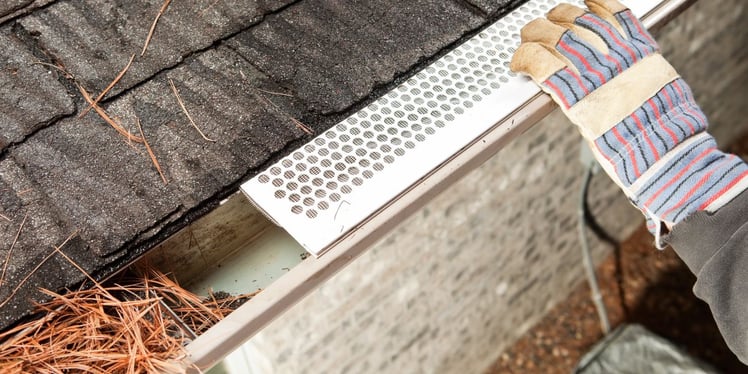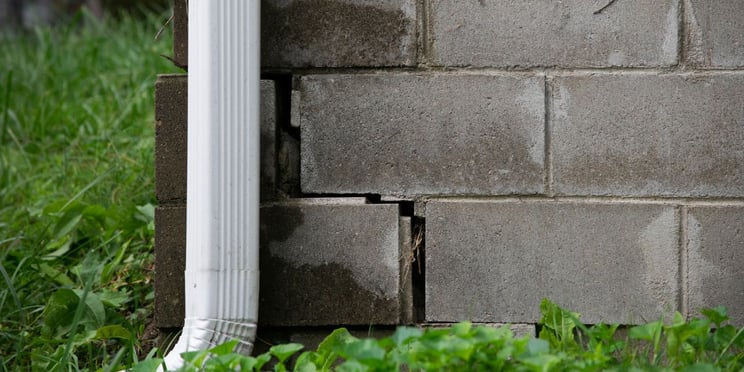As the weather warms up and snow starts to melt, spring can bring an increased risk of flooding in homes. Whether it's heavy rainfall or melting snow, excess water can seep into basements and crawlspaces, causing costly damage to homes and belongings. Fortunately, many causes of spring home flooding can be prevented with some simple steps. We'll explore some of the most common causes of spring home flooding and provide practical tips on how to prevent them. By taking these measures, you can help safeguard your property and prepare for the season ahead.
1. Clogged Gutters and Downspouts
Cause: Over the fall and winter months, leaves, twigs, and other debris can accumulate in gutters and downspouts, preventing water from flowing properly. If gutters become clogged, rainwater can overflow and collect near the foundation, increasing the risk of basement flooding and foundation damage. Clogged downspouts can also cause water to back up and overflow, creating pools of water near the foundation.
Prevention: Regular maintenance is key to preventing clogged gutters and downspouts. Clean gutters and downspouts at least twice a year, and more frequently if necessary. Use a sturdy ladder and wear gloves to remove debris by hand. Alternatively, use a gutter cleaning tool or hire a professional to clean the gutters for you. Consider installing gutter guards to reduce debris buildup and minimize the need for cleaning. Gutter guards can be made from a variety of materials, including mesh, foam, and brushes, and can be installed over the top of existing gutters. Regularly maintaining gutters and downspouts can help protect your home from water damage and prolong the life of your roof and foundation.

2. Poor Drainage
Cause: Poor drainage around a home can occur due to various reasons such as improper grading, damaged or clogged drainage systems, or a high water table. When the ground around a home slopes towards the foundation, rainwater and melting snow can collect and seep into the basement or crawlspace. This can lead to costly water damage and potential mold growth.
Prevention: The best way to prevent poor drainage is to ensure that the ground around your home slopes away from the foundation. This can be achieved through proper grading, which involves adding soil to raise the level of the ground around the foundation or excavating soil to create a slope away from the foundation. Regularly inspect your drainage system for damage or clogs, and have it serviced by a professional if necessary. By ensuring proper drainage around your home, you can help prevent water damage and protect your home's foundation.
3. Foundation Cracks
Cause: Foundation cracks can be caused by multiple reasons such as soil settlement, temperature changes, and water damage. In the spring, melting snow and heavy rainfall can saturate the soil around a foundation, increasing the risk of foundation damage. Water can seep into small cracks in the foundation and freeze, expanding the crack and causing further damage. Over time, these cracks can lead to significant structural damage and compromise the safety of the home.
Prevention: One of the best ways to prevent foundation cracks is to ensure that water is diverted away from the foundation. This can be achieved through proper grading and drainage around the home, as discussed earlier. Additionally, ensure that your downspouts and gutters are properly installed and functioning. Downspouts should extend at least 6 feet away from the foundation to prevent water from pooling near the foundation. If you notice any cracks in your foundation, even small ones, have them inspected by a professional as soon as possible. Early detection and repair can prevent further damage and save you money in the long run. A professional waterproofing contractor can assess your foundation and recommend the appropriate measures. By taking these preventive measures, you can help protect your home from foundation damage and maintain its structural integrity.

4. Sewer Backup
Cause: Heavy rainfall can overwhelm the sewer system, causing sewage to back up into homes through floor drains, sinks, and toilets.
Prevention: Install a backwater valve on your main sewer line to prevent sewage backup. Avoid flushing items like paper towels, wipes, and feminine hygiene products, which can clog the sewer system. Learn more about sewer backups and sewer backup insurance.
5. Poorly Installed or Maintained Sump Pump
Cause: Incorrect installation, power outages, lack of maintenance, or age can all contribute to sump pump problems. Sump pumps that are installed incorrectly may not function properly, while power outages can render them useless. Sump pumps that are not maintained properly may become clogged with debris or develop mechanical problems. Additionally, sump pumps have a limited lifespan and may need to be replaced after a certain number of years.
Prevention: To prevent sump pump problems, homeowners should ensure professional installation by hiring a plumber or contractor who can ensure that the pump is installed correctly and that the discharge line is properly connected and directed away from the foundation. Regular maintenance is also essential, including cleaning the pump and discharge line, checking the float switch, and testing the pump to ensure it is functioning properly. Homeowners can also install a battery backup system to provide power in the event of an outage. Finally, consider upgrading to a newer model with more advanced features and a longer lifespan to ensure proper operation and minimize the risk of basement flooding and water damage caused by sump pump problems.
Conclusion
Spring flooding can cause significant damage to homes and belongings, but many of the common causes can be prevented with some simple steps. Regular maintenance of gutters and downspouts, ensuring proper drainage around the home, preventing foundation cracks, installing a backwater valve on the main sewer line, and maintaining a sump pump can all help to prevent water damage and protect your property. By taking these preventive measures, homeowners can safeguard their homes and prepare for the spring season ahead. Remember, early detection and repair of any issues can save you money and prevent further damage in the long run.
Want to talk to the home insurance experts?







